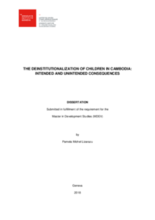Abstract
Recent research estimates 2.7 million children are in residential care worldwide. These figures have disproportionately increased in countries like Cambodia in recent years, receiving widespread attention from scholars and development practitioners. To counteract this rise, the Royal Government of Cambodia has decided to deinstitutionalize 30% of the children in residential care institutions by 2018. This research aims to shed light on the perceived intended and unintended consequences of this process that, to the best of our knowledge, has not yet been studied. For this purpose, first-hand observations and ten intensive interviews were conducted in Siem Reap and Phnom Penh during February and March 2018. Both purposive sampling for key informants and convenience sampling for staff members of the residential care facilities were used. The main findings indicate perceived shortcomings in the required monitoring of reintegrated children and youth, who seem to be facing challenges such as having to drop out of school. This situation calls for a more in-depth evaluation of the process to ultimately guarantee "the best interests of the child.”

